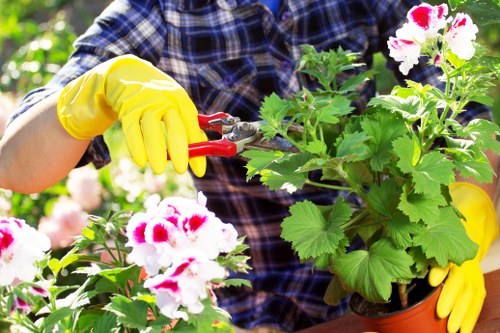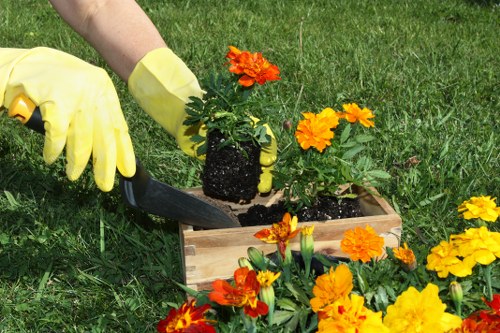Effective Oil Stain Removal for Driveways in North End

Oil stains on driveways are a common issue faced by homeowners in the North End. Whether it's from a leaking vehicle, spills, or routine maintenance, these stains can detract from the appearance of your driveway and potentially damage the surface if not addressed promptly.
Removing oil stains requires the right approach and materials to ensure that the driveway remains clean and free from further damage. This guide provides effective methods and tips tailored specifically for residents in the North End.
Understanding the nature of oil stains is the first step in effective removal. Oil is a non-polar substance, which means it doesn't mix with water, making it challenging to eliminate using standard cleaning methods.

Common Causes of Oil Stains on Driveways
Driveway oil stains can originate from various sources:
- Vehicle Leaks: Cars, trucks, and motorcycles can leak oil from engines, transmissions, or other parts.
- Spills: Accidental spills from transporting mechanics, gardening equipment, or other machinery.
- Maintenance Activities: Routine maintenance tasks that involve oil-based products.
Identifying the source helps in selecting the most effective removal method.
Early intervention is crucial. The longer an oil stain sits, the harder it becomes to remove.

Preparation Before Removal
Before attempting to remove oil stains, gather the necessary materials:
- Absorbent Material: Such as kitty litter or sawdust.
- Cleaning Solution: Options include dish soap, commercial degreasers, or a mixture of vinegar and baking soda.
- Scrubbing Tools: A stiff-bristled brush or broom.
- Protective Gear: Gloves and protective eyewear.
Ensure the area is well-ventilated, especially if using commercial products.
Protect your hands and eyes to prevent irritation from cleaning agents.

Step-by-Step Oil Stain Removal Process
1. Blot and Absorb
Start by blotting the stain with absorbent material to soak up as much oil as possible. Apply a generous amount and let it sit for about 15 minutes before sweeping it away.
2. Apply Cleaning Solution
Pour the chosen cleaning solution directly onto the stain. For natural options, a mixture of vinegar and baking soda can be effective.
Natural Cleaning Solution Recipe:
- 1 cup of white vinegar
- 1/2 cup of baking soda
- 2 cups of hot water
Combine the ingredients and pour over the stain.
3. Scrub the Area
Using a stiff-bristled brush, scrub the stain in a circular motion to help the cleaning solution penetrate the oil.
4. Rinse Thoroughly
After scrubbing, rinse the area with hot water to remove the cleaning solution and loosened oil residues.
5. Repeat if Necessary
For persistent stains, repeat the process until the oil is fully removed.

Preventive Measures to Avoid Future Stains
Preventing oil stains is more effective than dealing with them after they occur. Here are some tips:
- Regular Vehicle Maintenance: Ensure that vehicles are regularly checked for leaks.
- Use Protective Mats: Place mats or trays under machinery and vehicles.
- Seal Your Driveway: Applying a sealant can create a barrier against oil penetration.
Implementing these measures can save time and resources in the long run.
Choosing the Right Sealant
Sealants come in various types, including acrylic, epoxy, and polyurethane. Selecting the right one depends on your driveway material and the level of protection desired.
Benefits of Sealing Your Driveway:
- Prevents oil seepage
- Enhances appearance
- Increases longevity of the driveway
When to Call Professionals
While DIY methods are effective for minor stains, severe or extensive oil damage may require professional intervention.
Professional services offer specialized equipment and expertise to handle stubborn stains without damaging the driveway.
Additionally, they can provide long-term solutions like driveway resurfacing or advanced sealing techniques.
Benefits of Hiring Professionals:
- Comprehensive stain removal
- Time-saving
- Enhanced driveway protection
Consider professional help if the stain covers a large area or if multiple attempts to remove it have failed.
Choosing the Right Service Provider:
- Check reviews and references
- Ensure they use eco-friendly products
- Verify their experience with oil stain removal
Eco-Friendly Oil Stain Removal Options
Environmental concerns make eco-friendly solutions increasingly important. Here are some green alternatives:
- Biodegradable Cleaners: Products that break down naturally without harming the environment.
- Enzymatic Cleaners: Utilize natural enzymes to break down oil molecules.
- DIY Solutions: Vinegar, baking soda, and other household items can effectively remove stains.
Using eco-friendly options not only protects your driveway but also the surrounding environment.
Benefits of Eco-Friendly Cleaners:
- Non-toxic and safe for pets and children
- Reduced environmental impact
- Often more cost-effective
DIY Eco-Friendly Recipe:
- 1 cup of white vinegar
- 1/2 cup of baking soda
- 2 cups of hot water
- Apply and scrub as usual
Maintaining a Clean Driveway
Regular maintenance is key to preventing oil stains from setting in:
- Sweep the driveway frequently to remove debris that can trap oil.
- Address spills immediately to prevent penetration into the surface.
- Schedule periodic cleanings to maintain the driveway's appearance.
Consistent care ensures that your driveway remains attractive and free from unsightly stains.
Scheduled Maintenance Tips:
- Monthly sweeping and washing
- Annual sealing or resurfacing
- Prompt leak inspections for vehicles and machinery
Tools for Maintenance:
- Broom and dustpan
- Pressure washer
- Sealant applicators
Local Services for Oil Stain Removal in North End
Several local businesses specialize in driveway maintenance and oil stain removal in the North End. Partnering with these experts ensures efficient and effective stain management.
- North End Driveway Cleaners: Offering comprehensive cleaning services using eco-friendly products.
- Urban Sealants: Specializing in sealing and protecting driveways against future stains.
- Green Clean Solutions: Providing environmentally safe cleaning methods for oil stains.
Choosing local services supports the community and ensures timely assistance when needed.
Factors to Consider:
- Experience and expertise
- Use of safe and effective products
- Customer reviews and testimonials
Making the Right Choice:
- Request quotes from multiple providers
- Ask about their cleaning process
- Ensure they offer guarantees for their work
Cost of Oil Stain Removal
The cost of removing oil stains varies based on the size of the stain, the condition of the driveway, and the chosen method.
DIY methods are generally more affordable but may require more time and effort. Professional services, while more expensive, offer efficiency and guaranteed results.
Estimated Costs:
- DIY Cleaning: $10 - $50 for materials
- Professional Services: $100 - $500 depending on the extent of the stain
- Driveway Sealing: $200 - $600 for comprehensive protection
Budgeting for regular maintenance can prevent larger expenses in the future.
Cost-Saving Tips:
- Use homemade cleaning solutions
- Address stains immediately to prevent spreading
- Regularly maintain and seal your driveway
Choosing the Right Materials
Selecting appropriate materials is essential for effective oil stain removal:
- Baking Soda: Acts as a gentle abrasive and absorbs oil.
- Dish Soap: Breaks down oil molecules for easier removal.
- Commercial Degreasers: Formulated specifically for tough oil stains.
Using the right materials enhances the efficiency of the cleaning process.
Recommended Products:
- Eco-Friendly Degreaser X
- BioClean Baking Soda Mix
- Ultra Scrub Dish Soap
Storage Tips:
- Keep cleaning materials in a cool, dry place
- Ensure proper labeling for easy access
- Dispose of any excess material responsibly
Understanding Driveway Materials
The type of driveway material affects the approach to oil stain removal:
- Concrete: Durable but porous, making oil absorption easier.
- Asphalt: Flexible and less porous than concrete.
- Pavers: Individual stones that can be more challenging to clean.
Each material requires specific cleaning techniques to avoid damage.
Material-Specific Tips:
- Concrete: Use a stiff brush to scrub and ensure thorough rinsing.
- Asphalt: Apply degreasers sparingly to prevent softening the surface.
- Pavers: Clean individual stones carefully to avoid dislodging them.
Protecting Your Driveway:
- Regular sealing for concrete and asphalt
- Rearranging pavers if necessary to prevent staining
- Using mats or trays under vehicles
Seasonal Considerations in North End
North End experiences varying seasons which can impact oil stain removal:
- Winter: Cold temperatures can make cleaning more challenging; use warm solutions to aid in oil breakdown.
- Spring: Increased rainfall may spread oil stains; address promptly.
- Summer: Heat can cause oil to set faster; quick action is essential.
- Autumn: Leaves and debris can trap oil; regular sweeping helps.
Adjusting cleaning methods seasonally ensures optimal results.
Winter Cleaning Tips:
- Use warm water solutions
- Protect against icy conditions
- Schedule cleanings during warmer daytime hours
Summer Tips:
- Clean stains immediately to prevent drying
- Use ventilated areas to handle fumes
- Stay hydrated while cleaning
DIY vs. Professional Removal
Deciding between DIY and professional oil stain removal depends on several factors:
- Severity of the Stain: Minor stains are suitable for DIY, while larger ones may require professionals.
- Time and Effort: DIY methods require time and physical effort.
- Budget: DIY is generally cheaper, but professional services offer convenience and guarantees.
Assessing these factors helps in making an informed decision.
Advantages of DIY:
- Cost-effective
- Immediate action
- Control over the cleaning process
When to Opt for Professionals:
- Persistent or large stains
- Desire for guaranteed results
- Lack of necessary tools or expertise
Long-Term Solutions for Driveway Maintenance
Implementing long-term solutions ensures the longevity and appearance of your driveway:
- Regular Sealing: Protects against stains and weather damage.
- Proper Drainage: Prevents pooling and absorption of oil.
- Use of Mats and Trays: Keeps oil and other substances from reaching the driveway surface.
These strategies reduce the frequency and severity of oil stains.
Drainage Solutions:
- Install French drains around the driveway perimeter.
- Ensure gutters and downspouts direct water away.
- Grade the driveway to promote water runoff.
Protective Accessories:
- Use rubber mats under vehicles
- Place trays for machinery and equipment
- Regularly inspect and maintain protective measures
Local Regulations and Environmental Considerations
Respecting local regulations is essential when dealing with oil stains:
- Disposal of Cleaning Materials: Follow local guidelines for disposing of used absorbents and cleaning agents.
- Use of Eco-Friendly Products: Prefer products that comply with environmental standards.
- Water Runoff Management: Ensure that wastewater from cleaning doesn't contaminate local water sources.
Adhering to these regulations protects both your property and the environment.
Environmental Protection Tips:
- Use biodegradable cleaning agents
- Contain and properly dispose of oil waste
- Install barriers to prevent runoff
Compliance with Local Laws:
- Check with local authorities for specific guidelines
- Obtain necessary permits for large-scale cleaning
- Stay informed about environmental initiatives in North End
Impact of Oil Stains on Property Value
Oil stains can negatively affect the curb appeal and overall value of your property:
- First Impressions: A clean driveway enhances the property's appearance.
- Structural Integrity: Persistent oil can degrade driveway materials, leading to costly repairs.
- Market Value: Well-maintained properties attract higher prices and better offers.
Investing in oil stain removal and driveway maintenance is a smart financial decision.
Long-Term Property Benefits:
- Increased aesthetic appeal
- Enhanced durability of driveway materials
- Higher resale value
Maintaining Marketability:
- Regular cleaning and sealing
- Promptly addressing any stains or damages
- Upgrading driveway materials if necessary
Testimonials from North End Residents
Residents in the North End have successfully managed oil stains using the methods outlined above:
- Maria S.: "Using a simple baking soda mix, I was able to remove the oil stain from my driveway without any professional help."
- John D.: "Hiring a local service made the process hassle-free, and my driveway looks brand new again."
- Emma L.: "Sealing my driveway last spring has prevented any new oil stains this year."
These experiences highlight the effectiveness of both DIY and professional approaches.
Success Stories:
- Quick and affordable DIY removal
- Professional services delivering lasting results
- Preventive measures ensuring long-term cleanliness
Community Support:
- Local workshops on driveway maintenance
- Support networks for sharing tips and services
- Neighborhood initiatives for cleaner environments
FAQs
1. How soon should I address an oil stain on my driveway?
Answer: It's best to address oil stains as soon as possible. The longer the oil sits, the harder it becomes to remove and the more it can penetrate the driveway material.
2. Can I use household cleaners for oil stain removal?
Answer: Yes, household cleaners like dish soap, baking soda, and vinegar can effectively remove oil stains. However, for stubborn or large stains, a commercial degreaser or professional service may be necessary.
3. Is sealing my driveway necessary for preventing oil stains?
Answer: Sealing your driveway is highly recommended as it creates a protective barrier that resists oil penetration, making future stain removal easier and preserving the driveway's integrity.
4. Are there eco-friendly options for oil stain removal?
Answer: Yes, there are several eco-friendly options available, including biodegradable cleaners, enzymatic cleaners, and DIY solutions using natural ingredients like vinegar and baking soda.
5. When should I consider hiring a professional for oil stain removal?
Answer: Consider hiring a professional if the oil stain is extensive, if multiple attempts to remove it have failed, or if you prefer a guaranteed and hassle-free solution.


